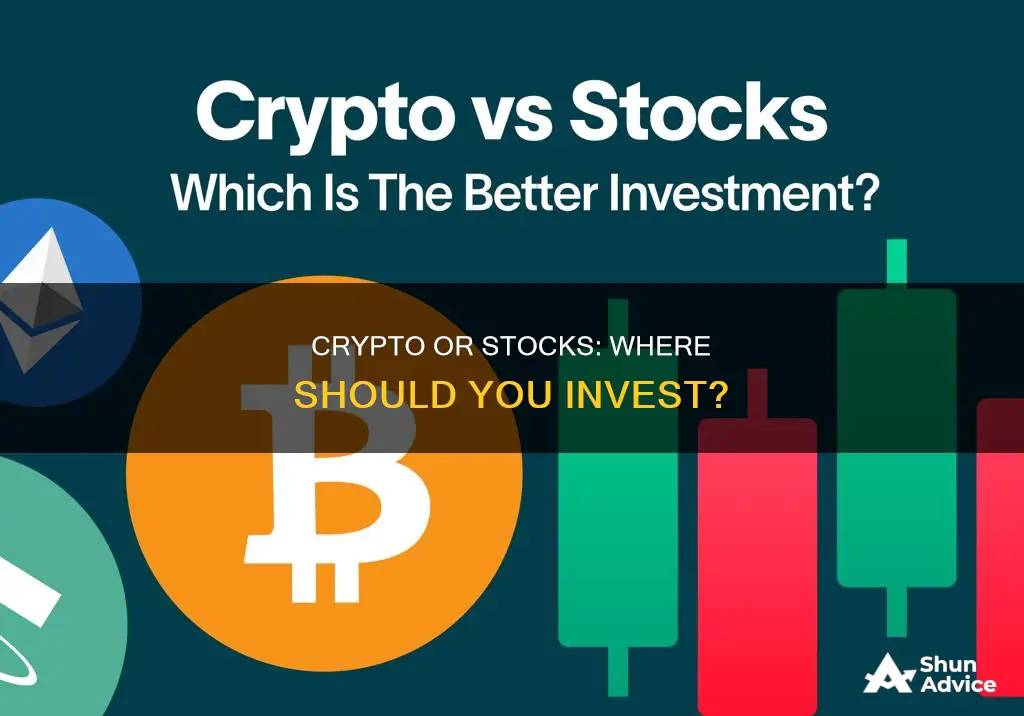
The choice between investing in crypto or stocks depends on an individual's risk tolerance, financial goals, and understanding of each asset class. Stocks are generally considered a safer investment option due to their long history of market exposure, government regulations, and intrinsic value. On the other hand, cryptocurrencies offer the allure of high returns, constant market access, and exposure to technological innovations. Stocks represent fractional ownership in a company, while cryptocurrencies are digital or virtual currencies using cryptography for security. Stocks have a long track record of solid returns, are heavily regulated, and operate through established exchanges. Cryptocurrencies, however, are highly volatile, offering potential for substantial gains but also come with significant risks.
| Characteristics | Values |
|---|---|
| Nature | Crypto is a digital asset, while stocks represent fractional ownership of a business |
| Trading Hours | Crypto can be traded 24/7, stocks are usually traded during regular business hours |
| Returns | Crypto offers the potential for high returns, stocks offer more stable returns |
| Risk | Crypto is highly volatile and considered riskier, stocks are less volatile but still carry risk |
| Regulation | Crypto has varied global regulation and is largely unregulated, stocks are highly regulated |
| Dividends | Stocks may offer dividends, crypto does not |
| Accessibility | Crypto has a low barrier to entry, stocks require more specialized knowledge |
| History | Stocks have a long history of solid returns, crypto is a newer asset class |
What You'll Learn

Stocks are safer
Stocks are generally considered safer than cryptocurrencies. Stocks have been around for longer and are backed by a company's assets and cash flow, whereas cryptocurrencies are not usually backed by anything. Stocks also have a long history of solid returns and are regulated by government bodies, offering investors a level of protection.
Stocks are also less volatile than cryptocurrencies, which can fluctuate wildly in price on a daily basis, driven by speculative trading and investor sentiment. Stocks are tied to corporate earnings and are less prone to the same level of price swings as cryptocurrencies.
The regulatory future of cryptocurrencies is uncertain, and many investors will not enter the market until there is a clear rulebook in place. The lack of regulation also adds an uncomfortable amount of risk to the crypto market. Stocks, on the other hand, are highly regulated, with a long history of established exchanges, and offer investors a greater sense of security.
Stocks are also more accessible to investors, with many online brokers cutting trading fees. Stocks are a good option for those who want to leave their money alone and not access it, whereas crypto is better for those who are happy to leave their money tied up and wait for it to recover.
Overall, stocks are considered a safer investment option due to their long history, government regulation, and lower volatility. They are a tried-and-true investment option that has delivered solid long-term returns.
Doge Coin Investment: Worthwhile or Risky Business?
You may want to see also

Crypto has a low barrier to entry
When it comes to investing, there are many options to choose from, including stocks, bonds, real estate, business ventures, and the more recent addition of cryptocurrencies. While stocks have been around for a long time and are considered a tried-and-true investment, cryptocurrencies offer new opportunities in the rapidly evolving digital landscape.
One of the advantages of investing in cryptocurrencies is their low barrier to entry. Here are some reasons why crypto is considered to have a low barrier to entry:
User-Friendly Platforms
Crypto exchanges and platforms have made it easier for new investors to enter the market. Platforms like MEXC Global allow investors to purchase crypto with bank cards, and the familiarity of Visa and Mastercard payments reduces the barrier to entry. Additionally, decentralized exchanges, which were once difficult to use, have become much more user-friendly with the emergence of swap platforms. These improvements in usability make it more accessible for newcomers to buy and sell cryptocurrencies.
Low Initial Investment
Cryptocurrencies can be purchased in small amounts, allowing investors to start with a low initial investment. For example, with MEXC Global, investors can buy up to $5,000 worth of crypto in a single transaction. This is in contrast to stocks, where the cost of individual shares can sometimes be high, especially for well-known companies.
Accessibility
The crypto market is accessible 24/7, allowing investors to trade at any time without the traditional market or bank restrictions. This constant market access means that investors can take advantage of price movements and react to market news as it happens, without having to wait for markets to open.
Simplified Account Opening
Opening a crypto brokerage account is a relatively straightforward process. You can open an account with a crypto brokerage, transfer funds, and start trading. The process is similar to opening a stock brokerage account, but with crypto, you often have the added benefit of being able to purchase fractions of a token, making it more affordable for newcomers.
Educational Resources
While there is a lack of expert-produced educational resources, there are still many communities and online resources available to help newcomers understand the basics of crypto investing. Platforms like Reddit and Twitter have communities dedicated to crypto, and content is available in various formats, including books, blog posts, articles, podcasts, and videos, making it easier for people with different learning styles to grasp the concepts.
In conclusion, cryptocurrencies have a low barrier to entry due to user-friendly platforms, low initial investment requirements, constant market accessibility, simplified account opening processes, and the availability of educational resources. However, it is important to remember that crypto investing still comes with risks, including volatility, cybersecurity threats, and regulatory uncertainties. Therefore, investors should always do their due diligence and carefully consider their risk tolerance and financial goals before investing.
Strategic Investment: Dodgecoin's Potential and Your Portfolio
You may want to see also

Stocks are highly regulated
When it comes to choosing between investing in crypto or stocks, there are several factors to consider. One of the most significant differences between the two is the level of regulation. Stocks are highly regulated, operating through established stock exchanges such as the New York Stock Exchange (NYSE) or the London Stock Exchange (LSE), while cryptocurrencies have varied global regulations.
The stock market has a long history, with more than a century's worth of regulations and legislation in place to protect investors. Government bodies such as the Securities and Exchange Commission (SEC) in the US have wide-reaching powers to investigate and punish any wrongdoing, ensuring that investors are treated fairly and honestly. In contrast, the cryptocurrency market is largely unregulated, with no clear regulatory framework in place. While some countries have started to set up regulations, others have banned cryptocurrencies outright. This lack of standardised global regulation means that cryptocurrencies may offer increased privacy and freedom but also harbour a greater risk of fraud or manipulation. The regulatory future of cryptocurrencies is uncertain, and many investors are hesitant to enter the market until there is clearer guidance in place.
The established and heavily regulated nature of the stock market provides a sense of security for investors. Stocks are tied to real-world, tangible business activities, and their value is influenced by corporate earnings and financial performance. Companies are required to disclose accurate financial information regularly, allowing investors to make informed decisions based on business results, cash reserves, growth prospects, and more. This transparency and regulation contribute to the perception of stocks as a safer and more stable investment option compared to the volatile and less predictable cryptocurrency market.
The level of regulation in the stock market also extends to taxation. The taxation aspects of stock-based gains are complex and well-defined, providing clarity for investors. In contrast, the lack of regulation in the cryptocurrency market creates uncertainty about how governments will tax crypto gains. This uncertainty is another factor that may deter some investors from entering the crypto space.
In summary, the highly regulated nature of stocks provides investors with a sense of security, transparency, and stability. The established stock exchanges, government oversight, and standardised regulations contribute to the perception of stocks as a safer and more predictable investment option compared to the relatively unregulated and volatile cryptocurrency market.
Bitcoins: Risky Investment, Uncertain Future
You may want to see also

Crypto is volatile
Cryptocurrency is a much more recent innovation than stocks, and it is still in the price discovery phase. Crypto markets are highly volatile, with significant price swings that would be considered major events in traditional financial markets. This volatility is driven by several factors, including speculation, news events, regulatory uncertainty, investor sentiment, and the unique supply and demand dynamics of the crypto market.
Speculation and News Events:
Like most assets, the price of cryptocurrencies is heavily influenced by supply and demand. Speculation about price movements plays a critical role in the value of cryptocurrencies at any given moment. News events, such as the COVID-19 pandemic, can also drive price swings in the crypto market. However, the effects of these events are often exaggerated in crypto due to its immature nature.
Regulatory Uncertainty:
The lack of standardised global regulation in the crypto market also contributes to its volatility. While some countries have started to set up regulatory frameworks, others have banned cryptocurrencies outright. Regulatory announcements and rumours can impact crypto prices in the short term, and the significance of these impacts is still being analysed and debated.
Investor Sentiment:
The crypto market is heavily influenced by investor sentiment. The typical crypto investor is an individual/retail investor who is less informed and more impressionable compared to seasoned traditional investors. Positive or negative views can spread like a contagion, with many investors following the actions of large players such as Tesla, which bought Bitcoin in January 2021.
Supply and Demand Dynamics:
The distribution between supply and demand also plays a major role in the volatility of crypto prices. The limited supply of certain assets, such as Bitcoin, which has a supply cap of 21 million coins, can create conditions where sudden increased demand puts even greater upward pressure on prices. Additionally, large holders, often called "whales", can significantly impact prices by buying or selling substantial quantities of a particular asset.
The crypto market is still in its infancy, and as it matures, many of the factors driving volatility are expected to subside. Increased institutional participation and regulatory oversight will likely play a role in reducing volatility in the future. However, for now, crypto investors must be prepared for the potential for greater returns or greater losses over shorter time periods compared to less volatile assets.
Bitcoin's Stability: A Safe Investment Haven?
You may want to see also

Stocks are tied to financial reports
The balance sheet outlines a company's assets, liabilities, and shareholders' equity on a specific date. It conveys the "book value" of a company, showing what resources it has and how they were financed. This sheet is important for calculating financial ratios and understanding a company's financial position.
The income statement, or profit and loss (P&L) statement, provides details on revenue, expenses, and the cumulative impact of revenue, gain, expense, and loss transactions over a given period. It includes information such as revenue, expenses, gross profit, operating income, and net income.
The cash flow statement offers a detailed view of a company's cash transactions, showing cash inflows and outflows over an accounting period. It is divided into three sections: operating, investing, and financing activities, providing insight into the company's short-term financial health and ability to generate cash.
These financial statements are interconnected and provide a comprehensive view of a company's financial health, performance, and potential issues. They are essential for investors to understand a company's value, financial position, and investment qualities.
A Beginner's Guide: Investing in Bitcoin Gold
You may want to see also
Frequently asked questions
Stocks have a long history of solid returns, with the S&P 500 stock index returning about 10% over the long term. Stocks are also highly regulated and operate through established stock exchanges, offering investors more protection.
Stocks are subject to high taxation and regulation, and the average beginner investor may find it more difficult to invest in the stock market compared to cryptocurrency due to its complexity and bureaucracy.
Cryptocurrency offers a low barrier to entry, enhanced privacy features, and high liquidity. It is also independent of centralized banks, which means investors do not have to wait for financial institutions to verify their transactions.







